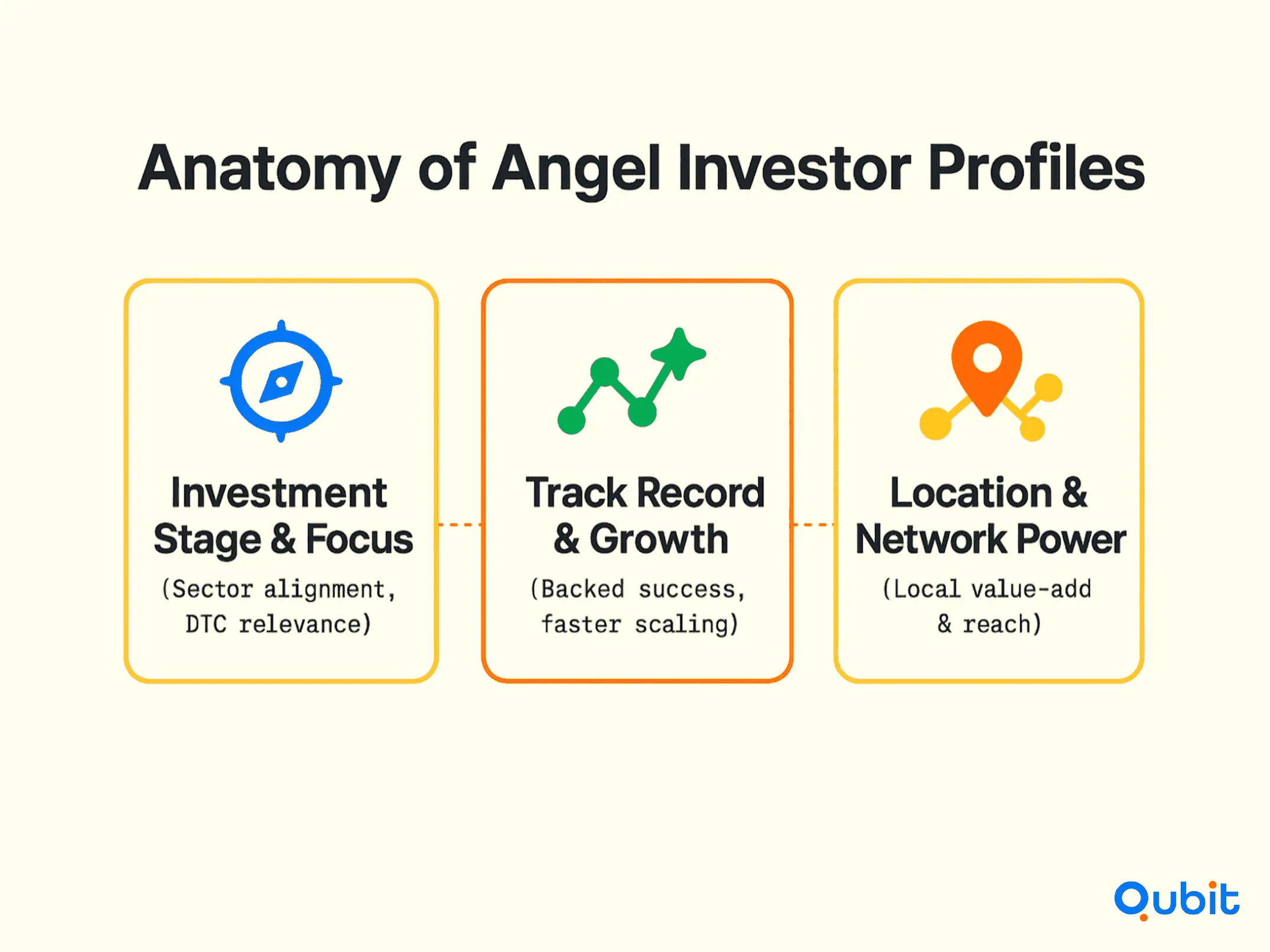Direct-to-consumer (DTC) and e-commerce brands are thriving in a digital-first world, but scaling these ventures often requires strategic funding. Angel investors for ecommerce businesses play a pivotal role in providing early-stage capital, mentorship, and industry connections. These investors, often seasoned entrepreneurs themselves, understand the unique challenges of building consumer-centric brands.
For founders seeking to secure funding, understanding the dynamics of angel investment and syndicates is crucial. Your exploration of funding intricacies is enhanced by the discussion on ecommerce startup fundraising strategies, which lays out a structured overview of funding dynamics for e-commerce ventures.
This blog will delve into how angel investors and syndicates support DTC and e-commerce brands, offering insights into investor profiles, outreach strategies, and practical tools to streamline your fundraising journey.
Discover Ecommerce Angel Investors and Database
Finding the right angel investors for ecommerce brands can be a daunting task, but a centralized, curated list can make all the difference. By eliminating the need for manual searches, this resource provides direct access to investors specializing in e-commerce. It’s tailored for direct-to-consumer (DTC) businesses.
To set expectations, typical consumer internet angel investments fall within a range of $1M to $15M. These figures reflect prevailing cheque sizes in recent DTC and e-commerce seed rounds. Startups should prepare to tailor pitches for this investment tier when engaging listed investors.
Why a Curated Database Matters
A centralized database streamlines the process of connecting with angel investors who understand the unique challenges and opportunities of e-commerce. With access to a specialized list, startups can target investors whose expertise aligns with their business model, ensuring a higher likelihood of securing funding.
Market Insights on Angel Investment
Funding volumes in consumer products have recently contracted, with investments falling from $5B in 2021 to under $150M by 2023. These figures underscore how competitive and selective the current environment is. Startups must strategically leverage curated investor connections.
The global angel investment market is experiencing remarkable growth, driven by increasing entrepreneurial activity and reduced entry barriers. Valued at USD 27.83 billion in 2024, it is projected to reach USD 72.35 billion by 2033, growing at an impressive 11.3% CAGR. This upward trend highlights the expanding opportunities for e-commerce startups seeking funding.
Additionally, survey data reveals that 40% of angel investors plan to increase their investments in 2025. This optimism underscores the growing potential within the ecosystem, making it an ideal time for e-commerce brands to explore funding opportunities.
Angel Investor Profile Details
Understanding the nuances of angel investor profiles can significantly enhance a startup's ability to secure funding. These profiles typically include essential details such as the investor's name, location, company affiliation, investment focus, and track record. By analyzing these data points, startups can identify investors whose goals align with their business vision and growth trajectory.
Performance studies reveal average returns of 2.6× over 3.5 years with a 27% IRR for angel investors. These metrics help founders set realistic expectations and benchmark potential outcomes from aligned investor relationships.

Investment Stage and Focus
Angel investors often specialize in particular investment stages, such as seed funding or early growth. Knowing whether an investor prioritizes e-commerce startups or other industries ensures a more targeted approach. For example, e-commerce investor profiles can reveal whether an investor has a history of backing direct-to-consumer (DTC) brands, making them ideal partners for scaling online businesses.Historical Performance
Reviewing an investor's track record provides insights into their success rate and the types of companies they have supported. Angel-backed companies frequently experience 30–50% faster growth, underscoring the importance of finding the right match.Location and Network
Proximity can play a crucial role in fostering collaboration. Investors with strong local networks often provide additional value through mentorship and connections, which can be pivotal for startups aiming to expand regionally or globally.
Why Investor Alignment Matters
Targeting investors who share your vision can streamline the funding process and accelerate growth. Exploring investor alignment becomes clearer when you consider the insights provided by find investors ecommerce startup, which delineates methods for identifying investors that resonate with your business vision.
By focusing on these critical aspects, startups can build meaningful relationships with angel investors, ensuring not just financial backing but also strategic guidance tailored to their industry.
Alignment is especially important because 52% of angel exits result in a loss. This reflects the inherent uncertainty in early-stage investing and underlines why detailed profile review is critical for both sides.
How to Get Access to the List
Securing access to a curated angel investor database can be a game-changer for your fundraising efforts. By following a structured approach, you can maximize the utility of this resource while ensuring your outreach is both strategic and effective.
1. Duplicate the Investor List
Start by duplicating the angel investor list to create a personalized version tailored to your needs. This step allows you to organize the data based on your fundraising goals, industry focus, or geographic preferences. Use tools like spreadsheets or CRM platforms to categorize investors by criteria such as investment history, preferred sectors, or funding stages.
2. Prepare Tailored Outreach
Crafting personalized outreach strategies is essential for capturing the attention of potential investors. Begin by researching each investor’s portfolio to understand their interests and past investments. Use this information to create customized pitches that highlight how your business aligns with their investment goals. Avoid generic messages—specificity and relevance are key.
3. Track Follow-Ups
Maintaining detailed follow-up records ensures that no opportunity slips through the cracks. Use tracking tools or CRM systems to log communication dates, responses, and next steps for each investor. This organized approach not only helps you stay on top of your outreach but also demonstrates professionalism and commitment.
For additional insights into potential investors, explore the top ecommerce VC firms 2025, which offers a concise examination of market trends and investment options. This resource can complement your angel investor list by connecting you to upcoming VCs who might align with your goals.
Angel Syndicates & Networks
Beyond individual angels, syndicates and networks play a growing role in DTC and e-commerce funding. These groups pool capital and expertise, allowing startups to access larger checks and a broader support network:
- Access larger funding amounts
- Tap into broader mentor networks
- Gain industry validation
- SuperAngel.Fund: Focused on DTC, this syndicate is known for mentorship and hands-on support for emerging brands.
- AngelList Syndicates: Many top angels (including Naval Ravikant and Edward Lando) run syndicates through AngelList, enabling smaller investors to co-invest in promising DTC startups.
- NFX Signal: Maintains a dynamic list of the top 400 DTC seed investors, including both angels and syndicates, as voted by the startup community.
- Other Networks: Groups such as Portfolia (women-focused), Social Starts, and regional angel networks (like New York Angels and Tech Coast Angels) are also active in consumer and e-commerce deals
Benefits of Joining Organized Angel Groups
Building on the advantages of syndicates, joining organized angel groups can accelerate an operator’s transition into angel investing. These groups offer curated deal flow, mentorship from experienced investors, and exposure to diverse industries. Structured programs also provide ongoing education, helping new angels develop investment skills and confidence. This collective approach enhances both deal quality and long-term investment outcomes.
Investor Outreach Strategies
Connecting with investors requires a thoughtful approach that prioritizes personalization, clarity, and convenience. By refining your outreach strategies, you can foster meaningful engagement and empower investors to explore opportunities independently.
1. Personalization Through Research
Tailoring your outreach begins with understanding your audience. Conduct in-depth research to identify investor preferences, goals, and past investments. This allows you to craft messages that resonate with their interests and demonstrate your alignment with their objectives. For example, highlighting how your business complements their portfolio can make your pitch more compelling.
2. Simplify Communication
Clear and concise communication is essential for capturing investor attention. Avoid overwhelming them with excessive details; instead, focus on delivering key points that showcase your value proposition. Use straightforward language and organize information logically to ensure your message is easy to digest.
3. Innovative Self-Service Solutions
Providing self-service tools can empower investors to evaluate opportunities at their own pace. Platforms that offer detailed financial data, market analysis, and interactive dashboards can enhance transparency and trust. These tools not only streamline the decision-making process but also encourage deeper engagement with your business.
For additional insights on refining your outreach approach, explore the narrative on retail corporate venture ecommerce investment, which delves into alternative funding channels and investor dynamics in the e-commerce sector.
Fundraising Advice
Investment for your startup requires a blend of adaptability, authenticity, and strategic momentum. By adopting flexible fundraising approaches, tapping into community referrals, and building investor excitement, founders can position their startups for optimal terms.
Modern fundraising leverages technology. In a recent example, AI reduced a founder's $5M ask to $3.2M for 22% ownership from an initial 12% dilution. This demonstrates how data-driven adjustments can deliver more tailored capital terms.
1. Embrace Flexibility in Fundraising Strategies
Rigid fundraising plans can limit opportunities. Instead, tailor your approach to align with market conditions and investor preferences. For example, Sandboxx, a startup led by Sam Meek, successfully scaled its operations by integrating essential financial tools. Meek emphasized the importance of investing in people and leveraging resources to upskill teams, showcasing how adaptability in operational strategies can complement fundraising efforts.
If you lack strong network referrals, consider engaging with virtual accelerators or online founder communities to expand your reach.
2. Harness the Power of Community Referrals
Referrals from trusted networks can open doors to investors who align with your vision. Building relationships within startup ecosystems, such as those fostered by ecommerce accelerators incubators, can provide mentorship and networking opportunities that enhance your fundraising strategies. These programs not only connect founders with potential investors but also offer guidance to refine pitches and secure funding.
3. Build Investor Momentum
Creating excitement around your startup is crucial. Momentum can be generated by showcasing traction, highlighting unique value propositions, and maintaining consistent communication with potential investors. When investors see a growing interest in your venture, they’re more likely to offer favorable terms.
4. Leverage Debt Financing for Non-Dilutive Growth
While equity funding is common, debt financing offers a valuable alternative for DTC and ecommerce founders. Debt options such as venture debt, revenue-based financing, and asset-backed loans provide capital without requiring founders to give up equity. This approach is particularly useful for businesses with predictable cash flows or significant inventory needs, as it matches repayment to revenue cycles and reduces dilution. By strategically combining debt with equity, founders can maintain greater ownership while accessing the funds needed to scale operations.
Choosing the right debt instrument depends on your business model, growth stage, and risk tolerance. Venture debt is often available to startups with existing equity backing, while revenue-based financing suits companies with steady sales but limited assets. Asset-backed loans can help manage inventory or receivables, providing flexibility during periods of rapid growth. Each option has unique terms and implications, so careful evaluation is essential to avoid over-leverage and ensure sustainable growth.
- Venture debt provides non-dilutive capital for startups with equity investors, supporting growth between funding rounds.
- Revenue-based financing aligns repayments with sales, easing cash flow pressure during seasonal fluctuations or marketing campaigns.
- Asset-backed loans leverage inventory or receivables, offering flexible funding for inventory-heavy DTC businesses.
DTC execution at scale can be game-changing. Frank Body illustrates this, generating $20M revenue within two years of launch. Their rapid growth resulted from effective funding, brand building, and product-market fit validation. This underscores how strong execution, paired with smart fundraising, enables breakout outcomes.
Conclusion
The right investor partnerships requires a thoughtful approach and actionable strategies. By accessing a curated investor database, understanding detailed investor profiles, and employing personalized outreach, startups can significantly enhance their fundraising efforts. Flexibility in adopting tailored fundraising advice further ensures alignment with unique business goals.
The importance of utilizing precise tools and data cannot be overstated. These resources empower startups to make informed decisions, streamline their processes, and optimize outcomes. Implementing these strategies will not only improve the likelihood of success but also foster meaningful connections with investors who align with your vision.
If you're ready to take your fundraising to the next level, we at Qubit Capital can help with our ecommerce fundraising assistance. Contact us to get started today!
Key Takeaways
- Understanding unit economics (the direct revenues and costs associated with a business model) is crucial for gauging profitability in e-commerce.
- Accurate analysis involves both item-level and customer-level metrics.
- Advanced approaches like predictive and flexible LTV models can refine financial planning.
- Value-based pricing is a more sustainable alternative to heavy discounting.
- Integrating unit economics with targeted email marketing enhances investor readiness.
Frequently asked Questions
How can a curated ecommerce angel investor database benefit my startup?
A curated ecommerce angel investor database simplifies your search, saving time and connecting you with investors who specialize in DTC businesses, improving funding outcomes.






